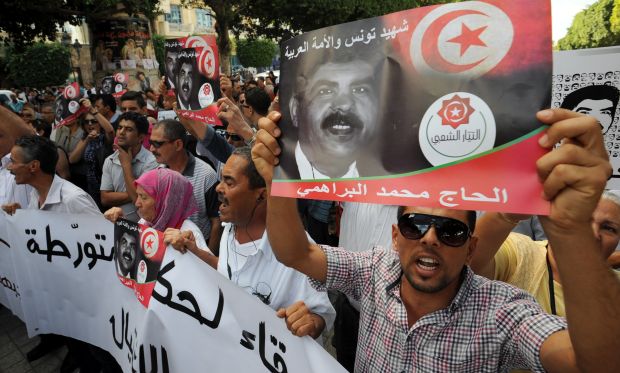
Protesters shout slogans and hold up portraits of assassinated Tunisian opposition figure Chokri Belaid during a demonstration in Tunis on October 2, 2013, organized to pressure the ruling Islamist party to tell the truth on the attack blamed on radical Islamists. (AFP)
Tunis, Asharq Al-Awsat—Sami Tahri, the deputy secretary-general of the Tunisian General Labor Union (UGTT), told Asharq Al-Awsat that the group is eagerly awaiting the outcome of the talks between the government and opposition that are scheduled to begin on Saturday. Tunisia’s ruling Islamist Ennahda party and their secular opponents are set to start three weeks of negotiations with a view to allowing the government to step down and make way for a caretaker cabinet until elections.
Tahri confirmed that the UGTT will participate in the talks with Ennahda, along with the opposition Popular Front—a coalition of left-wing and nationalist parties—and a representative of President Ali Laarayedh.
The majority of parties in Tunisia’s Constituent Assembly have expressed readiness to participate in a national dialogue based on the political roadmap drawn up by the country’s leading parties.
For its part, the opposition Popular Front coalition also confirmed that it would take part in direct talks with the government, scheduled to begin Saturday morning, adding that all parties must respect the roadmap.
“We are going to participate,” Popular Front leader Mohamed Jmour said, adding that “all parties have to respect the roadmap. . . . Otherwise, we will leave the dialogue.”
The UGTT, which brokered the upcoming talks, has emphasized that these are the only solution to resolving the ongoing political crisis engulfing Tunisia. This crisis erupted in July following the assassination of opposition leader Mohammed Brahmi by suspected Islamist militants—the second political assassination this year following the death of Chokri Belaid. The subsequent political and social turmoil served to weaken the North African country’s economy, raising concerns among international lenders.
The talks were initially scheduled to begin Friday, but have been delayed 24 hours following accusations and counter-accusations regarding responsibility for the Brahimi and Belaid assassinations. Opposition figures have been accusing Ennahda party leaders—in collaboration with Tunisian militant groups with links to former Libyan Islamic Fighting Group emir Abdelhakim Belhadj—of responsibility.
Opposition leaders have accused Ennahda of seeking to sabotage the national dialogue, with the ruling party strongly denying those accusations. Ennahda also denied any ties to the Ansar Al-Sharia group or the Islamic Fighting Group’s Belhadj, saying that these false statements are being spread by the opposition.
In a statement on Thursday, Ennahda said: “After coming close to commencing the first round of talks, these false accusations have appeared,” adding that this represents an attempt on the part of opposition groups to sabotage the dialogue.
For its part, the Tunisian judiciary have opened an investigation into the statements made by Tayeb Oqaili, a member of the National Truth Commission investigating the assassinations of Chokri Belaid and Mohamed Brahmi. On Thursday, Oqaili had made public secret documents seeming to implicate the ruling Ennahda movement in the assassinations.
The interior ministry has questioned the validity of the documents presented by the National Truth Commission, claiming that they are “forgeries.” The ministry also announced the suspension of four officials on charges of “leaking and mishandling official documents.”
